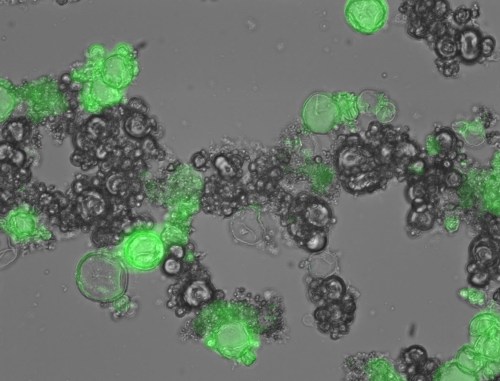A research team from Massachusetts Institute of Technology (MIT) has designed a new kind of nanoparticle that is capable of producing proteins on demand.
 MIT researchers designed these particles that can produce proteins when ultraviolet light is shone on them. In this case, the protein is green fluorescent protein. (Image: Avi Schroeder)
MIT researchers designed these particles that can produce proteins when ultraviolet light is shone on them. In this case, the protein is green fluorescent protein. (Image: Avi Schroeder)
After these ‘protein-factory’ nanoparticles arrive at their targeted sites, they can be made to produce protein by irradiating them with an ultraviolet light. The study findings have been reported in the NanoLetters journal.
According to Avi Schroeder, one of the researchers, the novel nanoparticles can deliver tiny proteins to destroy cancer cells and can also deliver larger proteins like antibodies that stimulate the immune system to kill tumors. This proof-of-concept can produce new compounds using inert starting materials within the body, he added.
The research team developed the protein-factory nanoparticles based on the naturally occurring protein production strategy. Cells store protein-developing information in DNA. These blueprints are then restored in mRNA, which deliver them to ribosomes where the blueprints get converted into amino acid sequences. These amino acids are then assembled to create the required proteins.
The nanoparticles developed by the MIT team can be self-assembled from a mixture comprising lipids that form the outer shells of the nanoparticles and a mixture of enzymes, amino acids and ribosomes required for protein production. The mixture also contains DNA sequences for the preferred proteins. The DNA is confined by DMNPE, a chemical compound that reversibly attaches to the DNA. When an ultraviolet light is made to shine over this compound, it releases the DNA for further protein synthesis.
In this experiment, the research team programmed its nanoparticles to synthesize luciferase or green fluorescent protein. Experiment results with mice demonstrated the particles’ ability to synthesize protein when they were irradiated by an ultraviolet light. The team is now focusing on nanoparticles that are capable of producing potential anti-cancer medicines.
Certain proteins can destroy both healthy and cancerous cells. However, this unique delivery technique enables protein synthesis only after the particles reached the targeted sites and does not affect healthy cells. The team is also trying to find new ways of triggering nanoparticles. Potential methods include synthesis activated by the level of acidity or other particular biological conditions of certain body cells or regions.